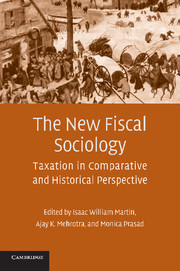Book contents
- Frontmatter
- Contents
- List of Contributors
- Acknowledgments
- Foreword
- 1 The Thunder of History: The Origins and Development of the New Fiscal Sociology
- PART ONE SOCIAL SOURCES OF TAXATION: AMERICAN TAX POLICY IN COMPARATIVE PERSPECTIVE
- PART TWO TAXPAYER CONSENT
- PART THREE THE SOCIAL CONSEQUENCES OF TAXATION
- 10 Extraction and Democracy
- 11 Improving Tax Administration in Contemporary African States: Lessons from History
- 12 Adam Smith and the Search for an Ideal Tax System
- 13 Where's the Sex in Fiscal Sociology?: Taxation and Gender in Comparative Perspective
- 14 The Shoup Mission to Japan: Two Political Economies Intersect
- Epilogue: A Renaissance for Fiscal Sociology?
- References
- Index
10 - Extraction and Democracy
Published online by Cambridge University Press: 13 January 2010
- Frontmatter
- Contents
- List of Contributors
- Acknowledgments
- Foreword
- 1 The Thunder of History: The Origins and Development of the New Fiscal Sociology
- PART ONE SOCIAL SOURCES OF TAXATION: AMERICAN TAX POLICY IN COMPARATIVE PERSPECTIVE
- PART TWO TAXPAYER CONSENT
- PART THREE THE SOCIAL CONSEQUENCES OF TAXATION
- 10 Extraction and Democracy
- 11 Improving Tax Administration in Contemporary African States: Lessons from History
- 12 Adam Smith and the Search for an Ideal Tax System
- 13 Where's the Sex in Fiscal Sociology?: Taxation and Gender in Comparative Perspective
- 14 The Shoup Mission to Japan: Two Political Economies Intersect
- Epilogue: A Renaissance for Fiscal Sociology?
- References
- Index
Summary
You might not have noticed that the authoritarian Louis XIV indirectly opened a path toward democratization, and that the authoritarian Vladimir Putin might likewise be opening a path toward democratization. It will take some unpacking to show you the parallels between the two visibly vindictive autocrats, and even more to identify their possible long-run contributions to democracy. But at least the unpacking will reveal some promising ways of thinking about taxation, fiscal sociology, and state extraction more generally.
Recovering from the near-disintegration of France during the Fronde of 1648–53 and assuming personal power in 1661 with the indispensable backing of Jean Baptiste Colbert, Louis XIV spent half a century building up the French state's central capacity. Building on the administrative innovations of earlier chief ministers Richelieu and Mazarin, he replaced largely autonomous regional governors with intendants who served at the king's pleasure. He battered, shrank, and subdued the large enclaves of Protestant power that had survived sixteenth-century wars of religion. He incorporated the once fractious French nobility into the rituals of his opulent court. He put down rebellions against state intervention – including fiscal intervention – so ferociously that they almost disappeared after having torn the country apart repeatedly before 1653. Although instead of simply stepping up the level of taxation he and Colbert widely adopted such expedients as forced loans and sales of offices, Louis XIV built a fiscal system that delivered revenues to support international wars of unprecedented cost and intensity.
- Type
- Chapter
- Information
- The New Fiscal SociologyTaxation in Comparative and Historical Perspective, pp. 173 - 182Publisher: Cambridge University PressPrint publication year: 2009
- 18
- Cited by



